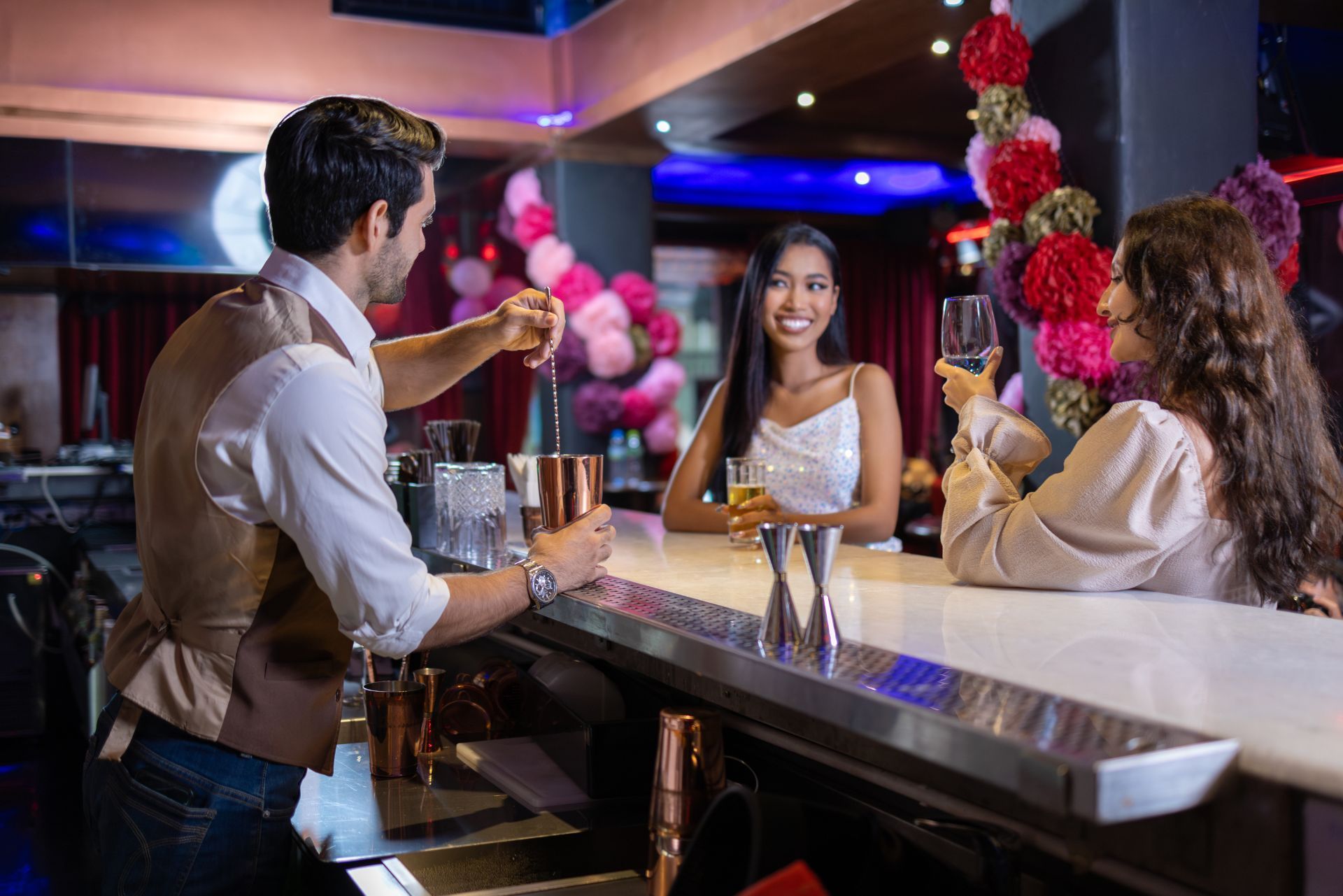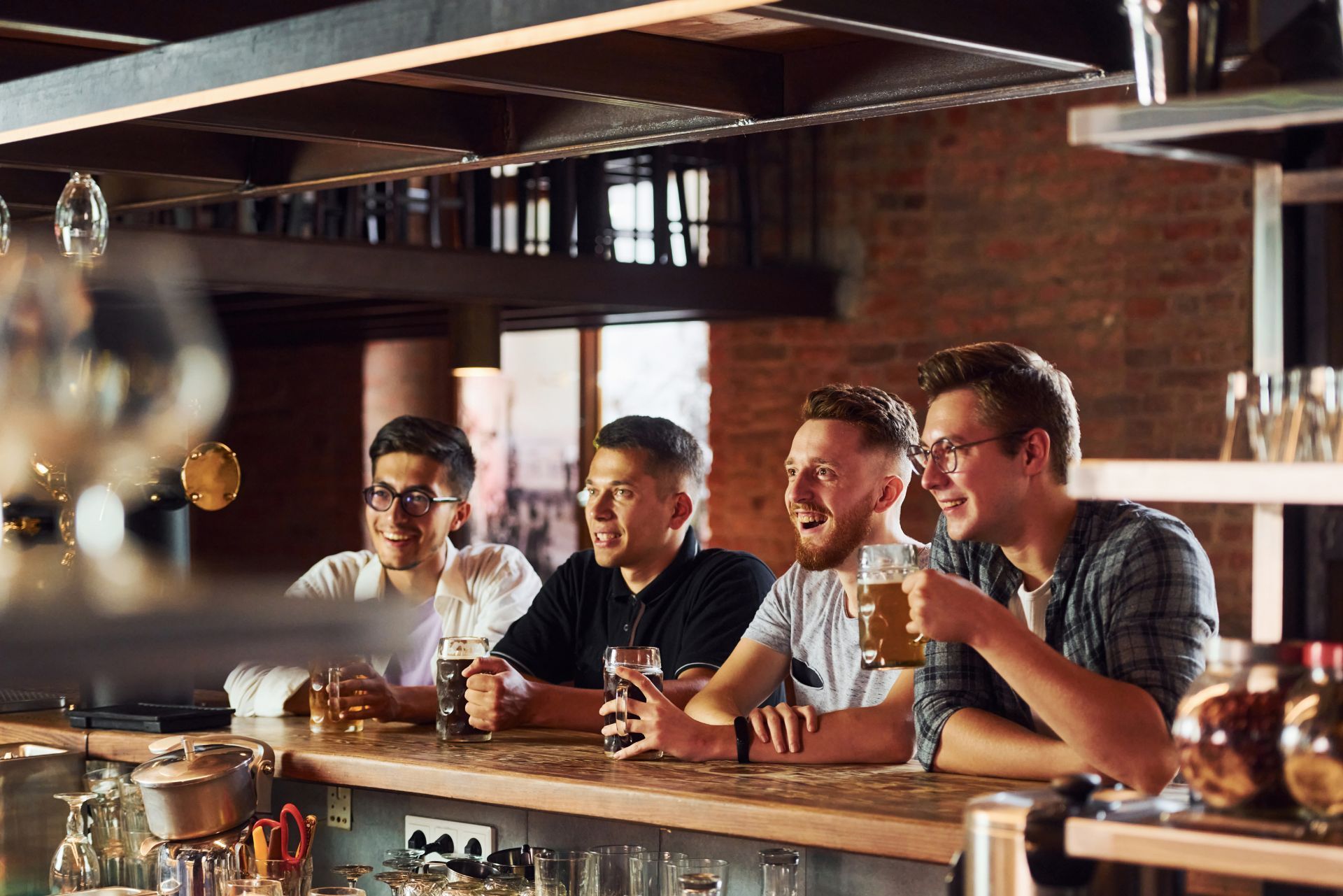Top 3 Recommended Policies

By: Lance Hale
Licensed Commercial Insurance Specialist
425-320-4280
The Pacific Northwest Bar Scene at a Glance
Washington State’s hospitality industry stretches well beyond Seattle’s glimmering downtown to include small-town taverns on the Olympic Peninsula, winery tasting rooms in Walla Walla, and craft-centric cocktail lounges in Spokane. More than 5,500 active liquor licenses are currently issued to on-premise establishments, according to the Washington State Liquor & Cannabis Board (LCB). These bars and restaurants generate an estimated $7.1 billion in alcoholic-beverage sales annually, employ roughly 167,000 Washingtonians, and serve millions of residents and tourists every year. Operating within such a vibrant yet highly regulated space means that owners must treat insurance coverage as seriously as mixology or menu design. A single claim for overserving, a kitchen fire, or a customer’s slip on a wet floor can end an otherwise successful venture if coverage limits are inadequate or if critical policy endorsements are missing.
In addition to the bustling urban centers, the Pacific Northwest is also home to a rich tapestry of local breweries and distilleries that have gained national recognition. Craft beer enthusiasts flock to the region for its innovative brews, with local establishments often experimenting with unique ingredients sourced from the surrounding landscapes. The rise of the craft cocktail movement has also led to a renaissance of traditional spirits, with bars focusing on artisanal techniques and locally-sourced mixers. This thriving scene not only enhances the local economy but also fosters a sense of community, as patrons gather to share experiences over a carefully curated drink, often accompanied by live music or local art displays.
Why Insurance Is More Than a Legal Necessity
Liquor liability insurance is mandatory when selling alcohol in Washington, but savvy proprietors recognize that a comprehensive insurance portfolio does more than satisfy state law; it preserves brand reputation, protects personal assets, reassures investors, and can even reduce future borrowing costs. Insurers reward well-protected businesses with better premiums, and prospective landlords or venture-capital partners often require proof of robust coverage before signing a lease or writing a check. As margins tighten and competition intensifies, insurance evolves from a box-ticking exercise into a strategic tool for long-term survival. Furthermore, with the increasing prevalence of social media, a single negative incident can quickly escalate into a public relations crisis, making it essential for bar owners to not only have the right coverage but also to implement proactive risk management strategies. This includes staff training on responsible service practices and maintaining a safe environment for patrons, which can further bolster their defense against potential claims.
Regulatory Framework: How Washington Dram Shop Laws Shape Coverage
Washington operates under a “dram shop” legal doctrine, which holds alcohol-serving establishments liable if they serve an obviously intoxicated person who subsequently injures themselves or others. RCW 66.44.200 outlines the prohibition against serving or selling liquor to visibly intoxicated individuals, while RCW 66.44.270 addresses service to minors. Civil actions that cite these statutes have climbed steadily, with the Insurance Information Institute reporting a 19 percent rise in liquor-liability claims across the Pacific Northwest over the past five years. Verdicts and settlements frequently stretch into seven-figure territory; in 2023, a King County jury awarded $4.6 million after a patron who had been overserved crashed into another vehicle on Interstate 5. This trend underscores the importance of responsible serving practices and the potential financial repercussions for establishments that fail to adhere to the law.
The implications of these laws extend beyond mere financial liability; they also influence the culture of alcohol service in Washington. Bartenders and servers are increasingly trained in responsible alcohol service techniques, which not only protect patrons but also safeguard the establishment from legal repercussions. Many bars implement their own training programs or partner with organizations that specialize in responsible beverage service, reinforcing a commitment to community safety and responsible consumption. This proactive approach not only helps to mitigate risks but also fosters a positive reputation among patrons who value establishments that prioritize safety and responsibility.
Mandatory Insurance Standards
Although Washington does not prescribe specific minimum policy limits in the same way it regulates auto insurance, the LCB requires applicants for a Spirits, Beer & Wine Restaurant license or a Tavern license to demonstrate that liquor liability coverage is “commercially reasonable.” In practical terms, insurers rarely issue policies with less than $1 million per occurrence/$2 million aggregate limits to bars in the state, and many upscale or high-volume venues carry $3–5 million umbrella policies to satisfy landlord requirements. This necessity for higher coverage limits reflects the increasing risks associated with alcohol service, as well as the growing awareness among operators of the potential for significant financial loss in the event of a claim.
The landscape of liquor liability insurance is also evolving, with insurers adapting their offerings to meet the unique challenges faced by establishments in Washington. As claims rise, underwriters are becoming more discerning, often requiring detailed risk assessments before issuing policies. Bars and restaurants may find themselves needing to invest in additional safety measures, such as enhanced security personnel or advanced training for staff, to qualify for more favorable insurance terms. These changes not only help to mitigate risks but also contribute to a more responsible drinking environment across the state.
Licensing, Inspections, and Proof of Coverage
Proof of insurance must accompany every new liquor license application and each annual renewal. The LCB audits proof of coverage, verifies the insurer’s credentials, and can suspend or revoke licenses if a bar permits a policy to lapse. Inspectors may also request a certificate of insurance during undercover compliance checks, making continuous coverage an operational imperative. This rigorous oversight ensures that establishments remain accountable and compliant with state laws, reinforcing the importance of maintaining a safe drinking environment.
Additionally, the LCB's commitment to regular inspections serves as a deterrent against negligent practices within the industry. Establishments that are found to be non-compliant face not only the risk of losing their liquor license but also the potential for increased insurance premiums and reputational damage. This creates a ripple effect, encouraging bars and restaurants to prioritize compliance and invest in training programs for their staff, ultimately leading to a safer atmosphere for patrons and a more sustainable business model for operators. The ongoing dialogue between regulators and the industry is vital, as it fosters a shared understanding of the responsibilities that come with serving alcohol in Washington.
The Core Insurance Policies Every Washington Bar Should Carry
Liquor Liability Insurance
This policy pays for legal defense, settlements, and awards stemming from claims that the bar served alcohol to a visibly intoxicated adult or a minor who later causes injury or property damage. Coverage typically includes assault and battery endorsements, which are critical given that nearly one in four liquor-liability claims involves a physical altercation. Premiums in Washington average $2,700–$7,800 annually for a standalone policy but are often packaged with general liability to unlock discounts.
General Liability Insurance
General liability covers bodily injury and property damage unrelated to alcohol. Think slips on spilled craft beer, customers tripping over a barstool, or property damage from a fallen speaker. Standard limits mirror liquor liability at $1 million per occurrence and $2 million aggregate, with annual premiums ranging from $1,200 for a small neighborhood pub to $9,000 for a high-capacity nightclub.
Commercial Property Insurance
Property insurance protects the building (if owned) and business personal property—furnishings, inventory, signage, and electronics—against perils such as fire, theft, or wind. Washington’s lush climate yields a relatively low tornado risk, but coastal bars must still face winter storm surges and occasional flooding. Replacement-cost coverage remains the best practice, particularly for vintage backbars and custom tap systems that are costly to reproduce.
Workers’ Compensation
Employers with even a single full-time worker must secure workers’ compensation through either the state fund (Washington is a monopolistic state) or an approved self-insurance program. With tipping culture elevating the proportion of part-time staff, payroll calculations become nuanced, and class-code misclassification can trigger audits or penalties.
Commercial Auto and Non-Owned/Hired Auto Coverage
If the bar owns a branded catering van, commercial auto insurance is mandatory. Even if no vehicles are owned, non-owned/hired auto coverage is strongly advised because bartenders frequently drive personal cars to make urgent supply runs or to deliver off-premise catering orders—a liability gap not covered by personal auto policies.
Cyber Liability and Data Breach Coverage
Washington bars process thousands of card transactions monthly. The state’s stringent data-breach notification law (RCW 19.255.010) imposes tight deadlines and potential fines. Cyber insurance pays for forensic investigations, customer notifications, credit-monitoring services, and potential lawsuits. Policies often start at $250,000 limits and cost as little as $650 annually.

Insurers rely on actuarial models that gauge a bar’s “risk posture.” Several controllable and uncontrollable factors shape premiums, and understanding them empowers owners to negotiate better terms.
Gross Annual Alcohol Sales
Underwriters correlate alcohol receipts with risk exposure. A speakeasy generating $350,000 in annual liquor sales will pay far less than a live-music venue topping $3 million. Many carriers set rate tiers—e.g., $0–$500k, $500k–$1 million, $1–$2 million—so strategic projection of the next year’s revenue matters.
Hours of Operation and Entertainment
Bars open past midnight, featuring DJs, dance floors, or door charges face higher liquor liability multipliers. The logic is simple: later hours mean greater intoxication and a higher potential for assaults. Conversely, wine bars closing by 10 p.m. can qualify for credits up to 15 percent on certain lines.
Security Measures and Staff Training
Implementing ID scanners, installing high-definition CCTV in critical zones, and maintaining a formal incident log can shave 5–12 percent off premiums. Completion of nationally accredited programs like the Alcohol Server Education Course endorsed by the LCB is another positive signal.
Claims History
Loss ratios over the past five years weigh heavily. A single minor claim may raise rates 10–20 percent at renewal; multiple large claims might lead to non-renewal. Submitting loss runs promptly when shopping coverage shows transparency and speeds up quoting.
Selecting an Insurer or Broker: Decision Criteria That Matter
The Washington market is served by regional carriers such as Columbia Insurance Group and Mutual of Enumclaw, as well as national players like Travelers and The Hartford. Many bars obtain coverage through specialty Managing General Agents (MGAs) who bundle liquor and general liability into industry-tailored programs.
Financial Strength and Claims Reputation
Owners should verify A.M. Best ratings of A- or higher to ensure solvency. Claims responsiveness often differentiates carriers: a weekend assault claim can’t wait until Monday morning. Ask potential insurers about 24/7 hotlines and average claim-acknowledgment times.
Brokerage Expertise
Hospitality-focused brokers possess granular knowledge of dram-shop case law, local fire codes, and insurer appetites. They also help structure layered excess policies—such as a $2 million primary followed by a $3 million umbrella—to meet escalating landlord requirements without overpaying for unnecessary limits.
The Claims Process: From Incident to Resolution
Even bars with impeccable safety records eventually confront a claim. Understanding the choreography of notice, investigation, and settlement prepares owners for smoother outcomes.
Immediate Incident Response
After an event—say, a patron’s drunk-driving accident—the manager must complete an incident report, preserve CCTV footage, and collect witness statements. Timely documentation prevents factual disputes and demonstrates good-faith cooperation to insurers.
Carrier Investigation and Reservation of Rights
The assigned adjuster reviews security footage, incident logs, and staff interviews. A “reservation of rights” letter may be issued, reserving the carrier’s option to deny coverage if exclusions apply. Common liquor-liability exclusions involve knowingly serving minors, so staff ID-check diligence is critical.
Defense, Settlement, and Subrogation
Insurers appoint defense counsel who may attempt early settlement or proceed to trial. If another party—e.g., a ride-share company—shares fault, carriers pursue subrogation to recoup costs, which can ultimately mitigate the insured’s loss history rating.
Common Loss Scenarios in Washington Bars
Assault and Battery
Alcohol-fueled assaults account for roughly 38 percent of Washington liquor-liability losses, per a 2022 analysis by the National Council on Compensation Insurance. Coverage for assault and battery is sometimes an optional endorsement, so bar owners must confirm inclusion.
Kitchen and Electrical Fires
Older buildings in Seattle’s Pioneer Square and Tacoma’s Brewery District often feature vintage wiring. Pair that with grease-laden ductwork, and the risk escalates. Property policies should include Business Interruption coverage to replace lost income during rebuilding.
Slip and Fall During Rainy Season
Washington sees up to 150 rainy days per year in coastal areas. Wet entrances create hazards that fall squarely under general liability. Installing industrial-grade floor mats and maintaining a visible “Wet Floor” sign rotation dramatically reduce claim frequency.
Risk Management: Practical Steps to Reduce Claims and Premiums
Adopt a Written Alcohol Service Policy
A documented policy clarifies cutoff times, drink-limit guidelines, and steps for refusing service. Posting this policy in the staff room, holding quarterly refreshers, and having employees sign acknowledgment forms strengthen a future legal defense.
Utilize Technology-Driven ID Verification
Scanning IDs instead of manually eyeballing them detects 95 percent of fake credentials, based on 2023 data from the Responsible Alcohol Service Council. The cost—roughly $1,200 for a quality scanner—often pays for itself through premium credits.
Regular Safety Audits
Quarterly walk-throughs that focus on egress routes, extinguisher inspections, and slip-resistant flooring help document proactive risk control. Many insurers provide complimentary loss-control consultants; taking advantage of these services can unlock additional policy credits.

Key Trends Shaping the Insurance Landscape
The insurance needs of Washington bars never stand still. Several industry trends warrant attention in the coming years.
The Post-Pandemic Surge in Take-Away Cocktails
Temporary legislative allowances for to-go cocktail sales became permanent in 2023 under SB 5448. While this revenue stream delights patrons, it adds off-premise liability exposure. Bars should confirm that policies extend liquor coverage beyond the physical premises.
Hardening Insurance Markets
After unprecedented wildfire payouts in the West, insurers have tightened underwriting guidelines across lines. Washington bars may see 5–15 percent premium hikes even without claims. Shopping early—60–90 days before renewal—allows time to solicit competitive quotes.
Heightened Cyber Threats
Point-of-sale malware attacks on hospitality businesses increased 22 percent nationally in 2023, per Verizon’s Data Breach Investigations Report. Multifactor authentication and end-to-end encryption now influence cyber-liability pricing as much as revenue volume.
Frequently Asked Questions
1. Is liquor liability insurance legally required in Washington State?
While not codified with explicit minimum limits, the LCB requires proof of “commercially reasonable” liquor liability coverage for all on-premise alcohol licensees. In practice, insurers set a de facto minimum of $1 million per occurrence.
2. How much coverage should a small neighborhood bar carry?
Most brokers suggest at least $1 million/$2 million for both liquor and general liability, plus a $1 million umbrella. Property limits should equal replacement cost, which is typically $250–$350 per square foot in urban cores.
3. Can servers be held personally liable?
Yes. Washington courts have allowed plaintiffs to sue individual servers who negligently overserve. However, the bar’s insurance policy generally extends coverage to employees acting within the scope of their employment.
4. Does my policy cover special events or off-site catering?
Not automatically. Many policies limit coverage to the scheduled premises. A special-events endorsement or separate short-term policy may be necessary for festivals, weddings, or pop-up activations.
5. How long should incident records be kept?
Washington’s statute of limitations for personal injury is three years, but insurers recommend retaining incident logs and video evidence for at least five years to cover delayed claims and litigation.
Conclusion: Safeguarding the Evergreen State’s Nightlife
Running a bar in Washington offers both creative freedom and significant responsibility. From the lively music halls of Bellingham to the cozy wine bars of Yakima, each establishment faces a unique combination of dram-shop liability, property risks, and emerging digital exposures. A well-structured insurance portfolio—anchored by liquor liability, supported by general and property coverage, and rounded out with modern endorsements—serves as the financial backbone of any successful operation. By understanding regulatory nuances, partnering with knowledgeable brokers, investing in proactive risk management, and keeping pace with industry trends, Washington bar owners can pour with confidence, knowing their hard-earned business is protected against the unexpected shocks that come with serving the Evergreen State’s favorite libations.

